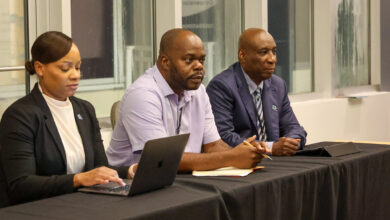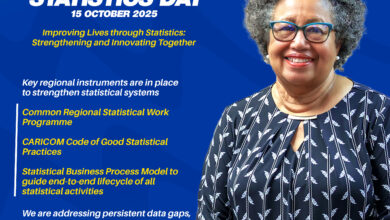His Excellency Mr. Greg Urwin, Secretary-General of the Pacific Islands Forum
Mr. Leonard Good, CEO and Chairman of the GEF
Other partners
Ladies and Gentlemen
It gives great pleasure on behalf of the Caribbean Community to join the Pacific Islands Forum as we salute our partnership with the GEF.
The Caribbean Small Islands and Low-lying Coastal States are located in the geographic zone where most:
- Are susceptible to hurricanes and tropical storms and are therefore very vulnerable to the impacts of climate change, sea level rise and climate variability;
- Are deficient in petroleum-based energy but have great potential for developing energy from alternative sources such as solar, wind, hydro and biomass;
- Have significant sources of marine and terrestrial biodiversity;
- Have limited land space and are subject to climate-induced land degradation as well as to flooding and severe droughts at different times of the year.
In the face of those and other realities of the high environmental, economic and social vulnerabilities, the Caribbean countries were among the first to take a strong interest in the international discussions on climate change, on biodiversity and on forests. Our nations have also become increasingly aware of the imperative of good land management to their sustainable development.
The Caribbean states have long realized that they can only meet these challenges to their sustainable development by joint action and by using the facilities provided under the various Multilateral Environmental Agreements. They have also long felt that action under these various agreements should be synergistic.
The Caribbean began to develop pilot projects for support under the Global Environment Facility shortly after its establishment in the early 1990s. The process was initially slow as all had to learn the rules as they evolved. We have had several pilot activities and to illustrate the development of the relationship, I wish to highlight two of these.
First, we had a pilot project, The Caribbean Project for Adaptation to Climate Change (CPACC). This was developed in conjunction with the World Bank as the Implementing Agency and the Organisation of American States (OAS) as Executing Agency. One of the main outputs of this pilot project is the establishment of the Caribbean Community Climate Change Centre in Belize. This also led to further support – including from the Canadian International Development Agency (CIDA) and the National Oceanic and Atmospheric Administration (NOAA) – for other climate change activities in the Caribbean Region. Chief among them is the GEF-funded Mainstreaming Adaptation to Climate Change (MACC) project. This, like CPACC, is being implemented by the World Bank but execution has shifted to the CARICOM Secretariat.
A second example is the GEF support for a pilot formulation project for energy – the Caribbean Renewable Energy Development Project (CREDP). This has now evolved into a full project, which will allow the Region to facilitate investment in different renewable energy technologies. It has also led to support for energy activities from other agencies including GTZ. Again, execution for CREDP has moved to the Region under the CARICOM Secretariat.
Our major purpose here in Mauritius and at this reception is to provide information on these activities and also to solicit the interest of other partners in working with the Region and the GEF to identify other projects that are germane to the implementation of the Region’s sustainable development agenda.
I look forward to our fruitful interactions and exchanges as we advance the development of our Regions and their peoples.





